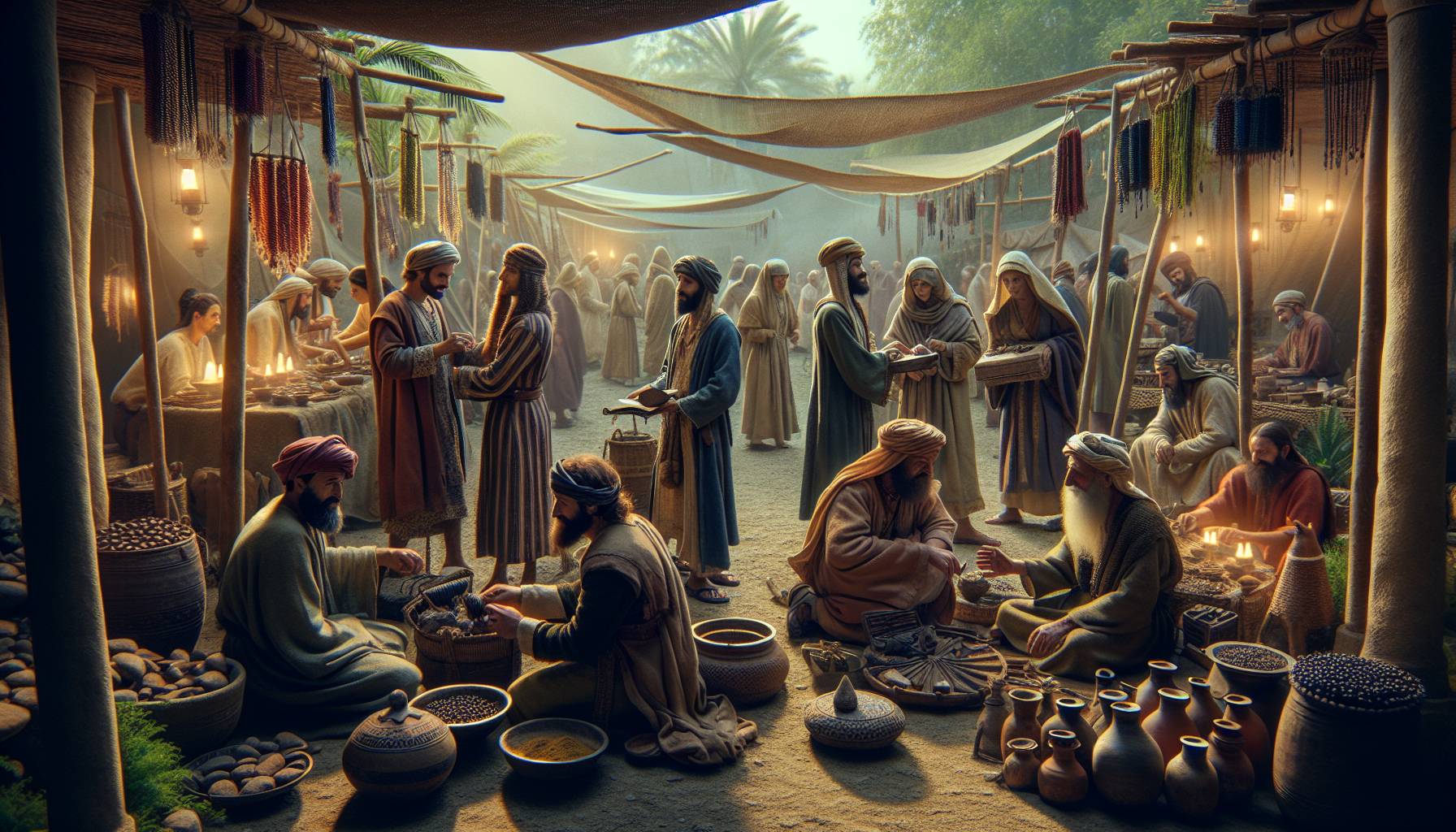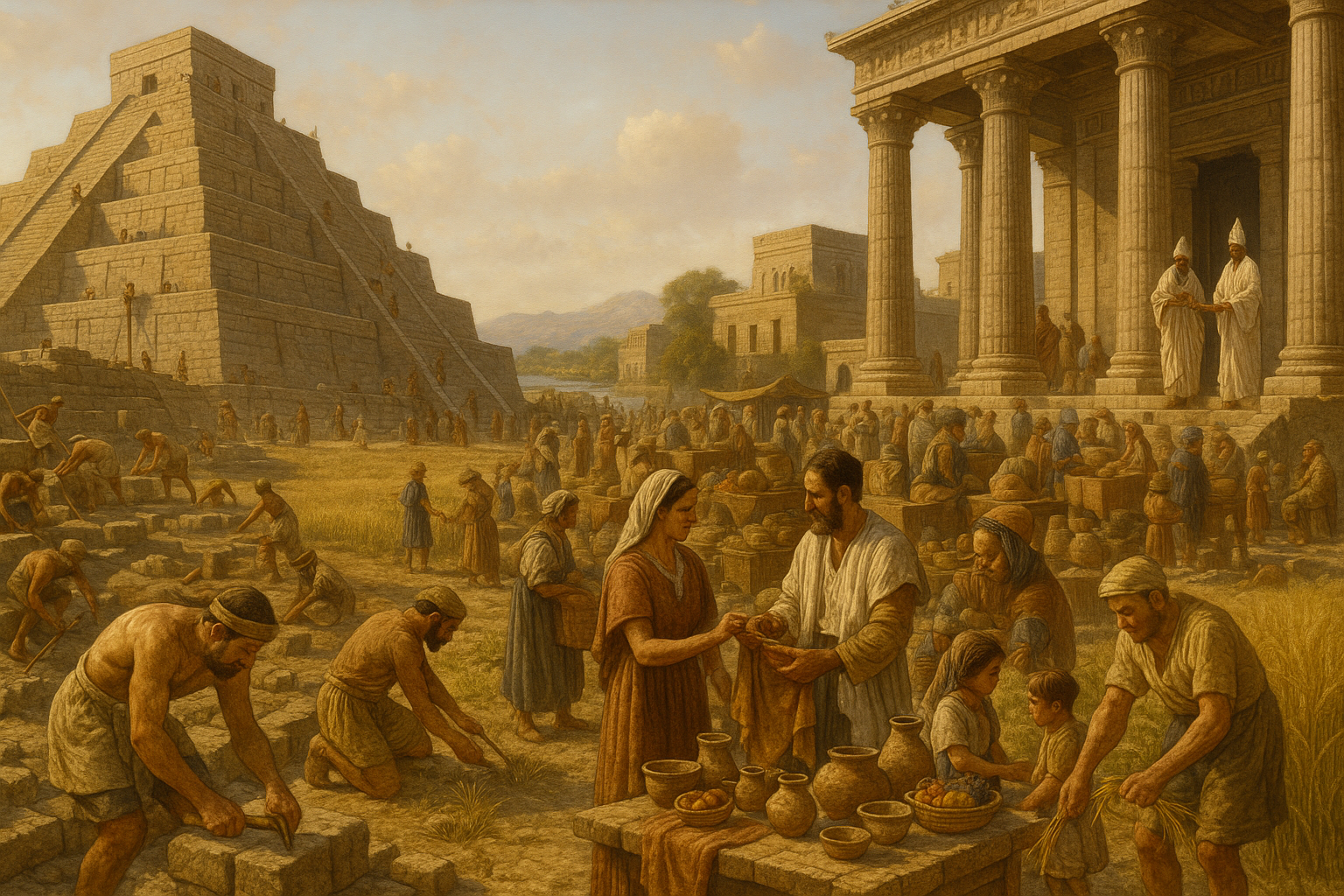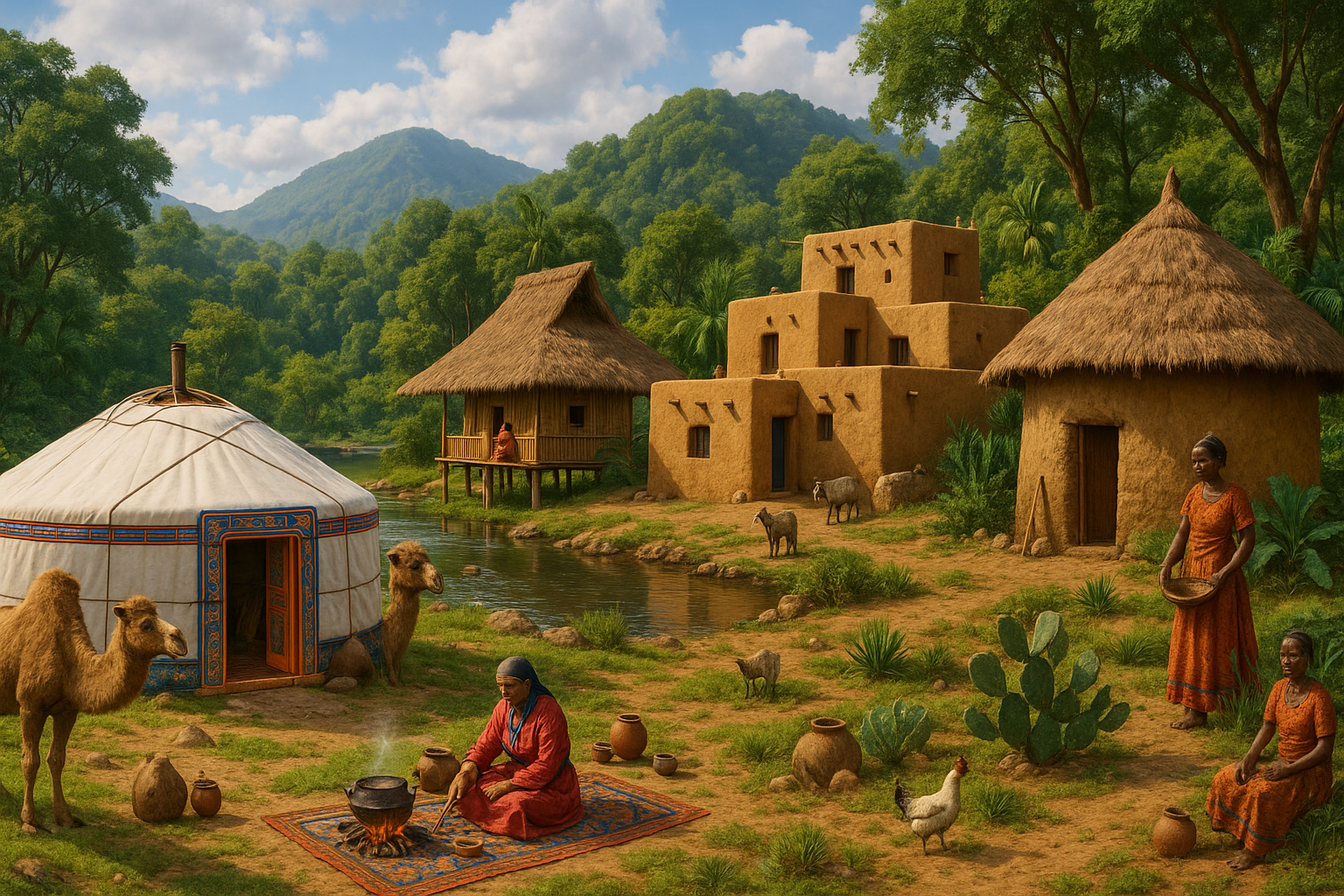In the age of digital transactions and cryptocurrency, it’s easy to forget the origins of trade — a time when goods were exchanged hand to hand, through the ancient art of barter. Unraveling the history woven through centuries, “Trade Tales: Uncovering the Ancient Art of Barter through Oral Tradition” takes a deep dive into this age-old practice. 🌍
The journey begins with the exploration of how barter systems formed the backbone of early civilizations, where trust and mutual benefit stood as the currency of exchange. Oral traditions from diverse cultures shed light on how communities negotiated goods and services long before the invention of money. These stories, passed down through generations, reveal the complexities and innovations of ancient trade networks.
Delving deeper, the narrative uncovers the rich tapestry of human interaction that barter facilitated. From tribal societies to bustling ancient cities, learn how this mode of exchange influenced social structures and economic development. Discover tales of legendary trades, where commodities like salt and spices were as valuable as gold, fueling exploration and expanding the world as they knew it.
The exploration does not stop at historical insights. It connects past practices with modern-day implications, examining how the principles of barter resonate within today’s gig economy and sustainable living movements. The resilience and adaptability of these ancient systems offer surprising lessons for contemporary economic challenges.
Join this captivating exploration of human ingenuity and adaptability. Through tales of trade, uncover how barter shaped not only economies but also cultures, encouraging cooperation and fostering relationships in a world before currency. 🏺
The Evolution of Barter Systems
The art of barter is as ancient as human civilization itself, predating the invention of money and the establishment of formal economies. The barter system facilitated trade between individuals and communities long before coins or currency were introduced. It was a practice deeply embedded in the oral traditions of societies, serving as both an economic and cultural exchange. Over time, the barter system evolved in complexity and scale, reflecting the needs and interactions of growing communities.
Early barter systems were largely localized, with transactions occurring within small communities or neighboring groups. The exchange of goods was based on mutual need and trust. For example, a farmer might exchange surplus grain with a neighbor for meat or tools. This form of direct trade relied on a “double coincidence of wants,” meaning both parties had to want what the other offered. This limitation often led to more complex exchanges or the development of informal networks to facilitate broader trade.
As societies expanded, so too did their trade networks. The evolution of barter systems saw the introduction of standardized goods as mediums of exchange, such as salt, spices, or livestock. These items were widely accepted and valued, acting as early forms of currency. Oral traditions played a critical role in this evolution, as stories and proverbs often communicated the value and fairness of trade, teaching generations about the importance of trust and reciprocity in economic interactions.
The Role of Oral Tradition in Barter
Oral tradition has been the cornerstone of human communication for millennia, and its role in barter is particularly significant. Before the advent of written language, oral narratives, stories, and songs were the primary means of preserving and transmitting knowledge. Through these narratives, the principles and practices of barter were shared, ensuring that the knowledge of trade could be passed down through generations.
These oral accounts often included tales of successful trades, cautionary stories of deceit, and the cultural values surrounding trade practices. They served as educational tools, helping individuals understand the complexities and nuances of barter. For example, a story might highlight the importance of honesty in transactions or illustrate the benefits of fair trade. Through storytelling, communities could convey the ethical and moral dimensions of barter, reinforcing the social bonds that underpin economic transactions.
Moreover, oral tradition allowed for the adaptation and evolution of barter practices. As communities encountered new challenges or opportunities, stories would be updated or altered to reflect these changes. This dynamic process ensured that barter systems remained relevant and effective in meeting the needs of society. In this way, oral tradition was not merely a passive reflection of economic activity but an active participant in shaping the ways in which communities engaged in trade.
Barter in Different Cultures
The practice of barter has been a universal phenomenon, evident in diverse cultures across the globe. Each culture has developed unique barter systems tailored to their specific environments, resources, and social structures. Understanding these variations provides valuable insights into the adaptability and resilience of human societies.
In Africa, for instance, barter was often conducted through extensive networks of kinship and community ties. Goods like grains, livestock, and handcrafted items were exchanged, with oral tradition playing a significant role in maintaining the integrity and trust necessary for these transactions. African proverbs and folktales often emphasize the importance of generosity and community, values that are reflected in their barter practices.
In contrast, the Indigenous peoples of the Americas utilized barter systems that were closely tied to their spiritual and cultural beliefs. Trade was not merely an economic activity but a form of social interaction that reinforced community bonds and mutual respect. Ceremonial exchanges were common, with oral stories and rituals accompanying these transactions to highlight their cultural significance.
Similarly, in Asia, the barter systems varied widely, from the intricate trade networks of the Silk Road to local exchanges within small villages. Oral traditions in Asia often included stories of legendary traders and the moral lessons they imparted, emphasizing the importance of wisdom and negotiation skills in successful barter.
Barter and the Transition to Money
The transition from barter to money was a pivotal moment in economic history, driven by the need for more efficient and scalable trade systems. While barter was effective in small communities, its limitations became apparent as societies grew and trade networks expanded. Oral traditions played a crucial role in this transition, bridging the gap between old and new economic practices.
As barter systems evolved, the introduction of money provided a solution to the limitations of direct exchange. Money served as a common medium of exchange, unit of account, and store of value, overcoming the challenges of the “double coincidence of wants.” Oral narratives and stories often reflected this shift, with tales of coins and currency entering the folklore of many cultures.
Despite the introduction of money, barter did not disappear. Instead, it adapted and persisted alongside monetary systems. Oral traditions continued to celebrate the art of barter, preserving its history and significance even as societies embraced new economic models. In some regions, barter remained a preferred method of trade for certain goods or during times of economic hardship, demonstrating its enduring relevance.
The Modern Revival of Barter
In recent years, there has been a resurgence of interest in barter as individuals and communities seek alternatives to traditional monetary systems. This revival is driven by various factors, including economic instability, environmental concerns, and a desire for more sustainable and community-oriented practices. The principles of barter, rooted in mutual exchange and reciprocity, align with these contemporary values.
Modern barter often takes place through organized networks and online platforms, facilitating exchanges between individuals who may not have otherwise met. These systems leverage technology to overcome the limitations of traditional barter, creating opportunities for trade on a global scale. Oral tradition continues to play a role, as communities share stories and experiences that reinforce the trust and cooperation essential to successful barter.
Barter is also gaining popularity in the business world, with companies exchanging goods and services to conserve cash and build strategic partnerships. This practice reflects a modern adaptation of ancient barter principles, demonstrating the versatility and enduring appeal of this age-old system.
Lessons from the Past: Barter’s Influence Today
The legacy of barter is evident in modern economic practices and cultural values. As societies navigate the complexities of a global economy, the lessons of barter offer valuable insights into the importance of trust, reciprocity, and community in economic interactions. These principles, embedded in oral traditions, continue to shape the way individuals and communities engage in trade today.
Barter systems have highlighted the importance of flexibility and adaptability in economic exchanges. This adaptability is crucial in an ever-changing world, where economic and environmental challenges require innovative solutions. By revisiting the principles of barter, communities can find inspiration in the past to address contemporary issues.
Moreover, the cultural significance of barter, preserved through oral tradition, reminds us of the social dimensions of economic activity. Trade is not merely a transaction of goods and services but a reflection of cultural values and social relationships. By embracing these lessons, modern societies can foster more equitable and sustainable economic systems that prioritize human connection and community well-being.

Conclusion
The ancient art of barter, deeply rooted in oral traditions, continues to offer profound insights into the human experience. As we have seen, barter systems were integral to the economic and cultural fabric of early societies, facilitating trade and communication long before the advent of currency. The narratives and stories that emerged from these practices were not just about trade but about the trust, reciprocity, and social bonds that underpinned economic interactions. 🌍
These stories have transcended time, offering valuable lessons for today’s globalized economy. They remind us of the importance of adaptability, flexibility, and community in overcoming economic challenges. As we navigate a world marked by rapid change and complexity, the principles of barter – fairness, honesty, and mutual benefit – remain as relevant as ever. 🤝
The resurgence of barter in contemporary contexts, from community exchanges to business transactions, underscores its enduring appeal. By harnessing modern technology and digital platforms, today’s barter systems are bridging gaps, creating opportunities, and fostering connections on a global scale. The lessons from barter’s past are not just historical footnotes but active guides for building more sustainable and inclusive economic systems. As we embrace these time-honored principles, we pave the way for a future where economic activity reflects our shared cultural values and strengthens our communal ties. 🌟
Toni Santos is a visual storyteller and experimental artisan whose work explores the strange frontiers where science meets art. Fascinated by the forgotten, the obscure, and the wonderfully absurd, Toni brings bizarre scientific experiments to life through provocative visual narratives and handcrafted creations that blur the line between curiosity and discovery.
His journey is rooted in a passion for the eccentric side of science — from electric shocks on cadavers to botany in hostile environments, from Victorian medical oddities to animal behavior gone rogue. Each project Toni undertakes sheds light on real (and sometimes questionable) scientific ventures that push the boundaries of human understanding.
With a background in visual design and hands-on craftsmanship, Toni blends artistic precision with conceptual boldness. His creations aren’t just decorative — they provoke, disturb, and invite the viewer to reconsider what counts as science, progress, or even sanity. Often inspired by true experiments — like galvanic resurrection, psychological endurance tests, or 19th-century pseudo-science rituals — Toni’s work reanimates these bizarre chapters of history with aesthetic intrigue and critical reflection.
As the creative force behind Vizovex, Toni invites you to explore a world where the strange becomes symbolic, the grotesque becomes beautiful, and every experiment tells a story worth unearthing.
His work pays tribute to:
The brilliant madness of forgotten experiments
The symbolic power of science at the edge of reason
The beauty in questioning what we think we know
Whether you’re a curious mind, a lover of scientific history, or simply drawn to the uncanny, Toni welcomes you to explore a realm where aesthetics and absurdity collide — one experiment, one mystery, one creation at a time.





